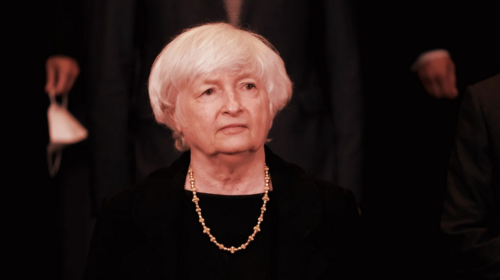

Janet Yellen in 2021.
In brief
Treasury Secretary Janet Yellen told members of Congress on Thursday that she doesn't believe the crypto market has grown to a scale that it poses a "systemic risk"—a designation that can trigger a raft of new regulatory measures.
Yellen's comments came during an appearance before the House Committee on Financial Services where members pressed her on macroeconomic issues, but also repeatedly raised the topic of stablecoins—crypto tokens that are meant to maintain a peg to a fiat currency—and the current crypto market meltdown.
"I can’t say [stablecoins] have reached a scale where they’re financial stability concerns," said Yellen.
Her observation came in response to a question from Rep. Jim Himes (D-CT) who noted that, as a veteran of the 2008 financial crisis, he did not believe a $2 trillion crypto market was big enough to trigger the systemic risk designation. Himes added that the $2 trillion figure was now much lower in light of the recent crypto market collapse.
While Yellen agreed with Himes' proposition that a $2 trillion market cap wasn't sufficient to trigger a systemic risk designation, she declined to say at what level—for example $5 trillion or $6 trillion—the designation would apply.
Following the 2008 crisis, Congress introduced legislation that recognized certain large financial entities—including banks and insurer AIG—as posing a "systemic risk" to the U.S. economy, and imposed a series of oversights, including higher capital reserves, on their business operations.
Yellen also noted that, while crypto and stablecoins don't currently meet the systemic threshold, that could change in the future.
"I wouldn’t characterize it as a real threat to financial stability, but they're growing very rapidly and present the same kind of risks we’ve known for centuries from bank runs," she said.
The hearing also addressed the recent meltdown of the token known as Terra USD (UST), a stablecoin that until this week had been the crypto market's third largest.
Yellen noted that UST, which is supposed to pegged to $1 but is currently trading around 48 cents, had "broken the buck" and that Tether, the largest stablecoin, had briefly done the same on Thursday morning. Tether dipped as low as 95 cents but is currently back trading at $1.
The Treasury Secretary, in response to a question from Rep. Himes, also stated she was aware of the distinction between algorithmic stablecoins like UST (which rely on financial incentives to preserve their peg to the dollar) and other stablecoins that are backed by a reserve of dollars.
Rep. Stephen Lynch (D-MA) also raised the issue of stablecoins, noting that there are upwards of 200 of them, and suggested the issuance of a central bank stablecoin would serve to eliminate most of them.
Yellen noted that financial regulators are studying the viability of a central bank digital currency, but noted that such a currency could pose a privacy risk if it allowed the government to monitor people's spending.
The questions about stablecoins at Thursday's hearing reflect a large push by Congress and the White House to impose new regulations on the crypto industry. In March, President Biden issued an executive order calling for better coordination among agencies when it comes to crypto, and there are several bills in Congress that aim to provide clearer rules for the industry.
